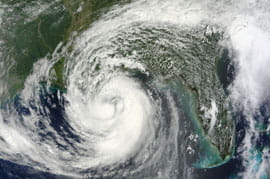Q&A with Scott Knowles: The Politics of Hurricane Isaac

The prospect of dangerous winds, flooding and fire has been ominously looming over the Gulf Coast, but the level of destruction to the southern U.S. is not the only aftermath many Americans are awaiting from the storm dubbed Isaac.
The storm, which has shifted in status between hurricane and tropical storm over the past few days, has been heavily compared and contrasted to 2005's ultra-devastating Hurricane Katrina-in both physical damage and political response.
DrexelNow caught up with Dr. Scott Knowles, an associate professor in the department of history and politics and an expert on risk and disaster within the realms of modern cities, technology and public policy, to discuss how Hurricane Katrina has shaped expectations for storm Isaac-and how reactions to the storm's effects could affect future natural disasters.
The federal government's response to Hurricane Katrina was a controversial topic in the disaster's aftermath. In what ways do you think politics have shaped the way policy makers are handling Isaac?
At a boring functional level, yes, there's been a lot of attention paid-making sure that municipalities and counties and states are talking to each other and planning effectively. I think anybody who's not comfortable with [disaster politics] is not paying attention to the fact that disasters are now as politicized in American life as anything. People associate disaster relief with the federal government, and that's not completely fair because much of disaster response occurs at the extremely local level, but only the federal government has the resources to get first responders on the site immediately.
The Obama administration, especially because this is an election year, [is] going to be making very sure that they are right on point in their response. He has an excellent FEMA director, Craig Fugate, who is very experienced in emergency management. They are really going to be watching the messaging and how they portray the president. I wouldn't be surprised if he was down at the scene soon after, as the face of benevolence for our citizens.
The Romney campaign is trying to figure out what to do as well, but they're confounded by the fact that he's not the president. They don't want the ugly specter of Katrina failure to come up, because that's associated with the GOP. Romney can't really do anything, but he's got to walk a delicate line there.
Did Hurricane Katrina subsequently affect media coverage of disasters? How is it being reflected in the coverage of Isaac?
The media has covered stories primarily of human interest and of government failure. That's not surprising because those are the types of stories they feel they can lead with and that will grab eyeballs. It's disappointing, because super investigative journalism would reveal many of the longterm issues. There's no secret that the levee system was poised for a disaster that was waiting to happen-papers in New Orleans were telling that story, but nationally, that hasn't really been covered.
A more responsible approach would be to tell [stories about more of the] systematic failures here. We have a really, really ancient infrastructure system for disasters across the country. That's not being covered in the media. The other issue is that our federal disaster system since September 11 has entirely shifted. Our number one disaster priority from the federal government's perspective is terrorism, and everything else is just a distraction-that's under the Bush administration and under the Obama administration. We could avoid deaths by natural disaster if we were spending money on disaster prevention that we were on terrorism prevention. And there aren't a lot of journalists covering that.
How has the aftermath of Hurricane Katrina-and in turn, the preventative measures being taken for Isaac-shaped public opinion and response?
An effective response builds public trust in government. But there's another angle to this, which [is that] Obama does not want to be seen as opportunistic in the face of disaster. He needs to take the action that's necessary to save lives down there and try to get relief in place. He's already being criticized from the other side, [which is saying] that it's "good" for a president to have a hurricane in the midst of election.
I think Americans have a bad habit of thinking of disasters the way we think of nature, which is outside of politics. If we're not ready for a disaster in New Orleans, it's because it wasn't a priority, not because it wasn't possible. Americans are a little squeamish about that. We like to think that we respond equally to each case, but we don't. If you're poor, if you're elderly, you have a much greater likelihood of dying in a natural disaster than if you're in the middle or upper class.
Whatever happens with Isaac, we are dealing with the legacy of decisions made after September 11, and the [focus has been] away from hazards we know are going to happen every year. Hurricane season happens ever year-we can be better prepared. We've taken our eye off of those because we focus on disasters we can't predict. That's not to say we shouldn't focus on terrorism prevention. We can do both, and we haven't been.
In This Article
Drexel News is produced by
University Marketing and Communications.